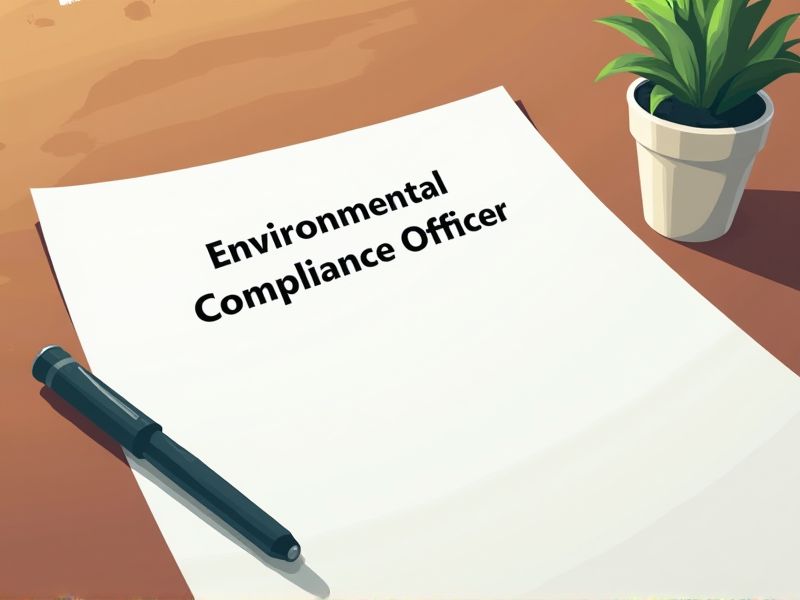
The role of an Environmental Compliance Officer involves ensuring adherence to environmental laws and regulations, thus requiring specialized knowledge. Certifications provide the necessary expertise to navigate complex environmental legislation and policies effectively. They also validate the officer's proficiency in risk management and sustainability practices, which are crucial for minimizing environmental impact. Key certifications can enhance an officer's capabilities in this field.
Certified Environmental Auditor (CEA)
Certified Environmental Auditors (CEAs) possess specialized knowledge which aids Environmental Compliance Officers in accurately assessing and mitigating environmental risks. This certification ensures a comprehensive understanding of regulatory requirements, which leads to more effective compliance management. Their expertise allows for thorough audits and the identification of potential non-compliance issues before they escalate. CEAs bring a structured approach to environmental compliance, which promotes sustainable practices and reduces the likelihood of legal and financial repercussions.
Certified Hazardous Materials Manager (CHMM)
The role of a Certified Hazardous Materials Manager (CHMM) provides comprehensive expertise in handling hazardous materials, crucial for ensuring an Environmental Compliance Officer can effectively manage and mitigate environmental risks. A CHMM helps organizations adhere to federal, state, and local regulations, thereby minimizing legal risks and potential fines. The specialized knowledge of a CHMM enhances an organization's ability to implement safe procedures and best practices for storage, transportation, and disposal of hazardous substances. By improving oversight and compliance, a CHMM plays a pivotal role in safeguarding both human health and the environment.
Registered Environmental Manager (REM)
A Registered Environmental Manager (REM) is needed for an Environmental Compliance Officer to ensure adherence to environmental regulations through expert knowledge and proven competencies. The REM provides comprehensive insights into environmental laws and policies, which enhances an organization's ability to avoid non-compliance penalties. Possessing an REM credential indicates a high level of expertise and a commitment to continuous education, essential for navigating complex environmental issues. This certification also fosters trust and credibility with stakeholders, promoting sustainable business practices.
ISO 14001 Lead Auditor Certification
Obtaining the ISO 14001 Lead Auditor Certification equips an Environmental Compliance Officer with a thorough understanding of environmental management systems, enhancing their ability to ensure adherence to established regulations. This certification provides credibility, demonstrating the officer's commitment to recognized international standards. It also enables the officer to conduct effective internal and external audits, identifying areas for improvement and ensuring compliance. Knowledge gained from this certification helps mitigate risks and improve sustainable practices within an organization.
NEBOSH Environmental Management Certificate
Having a NEBOSH Environmental Management Certificate provides an Environmental Compliance Officer with essential knowledge of global environmental issues and management systems. It ensures they understand and can implement legislative requirements to reduce environmental impact. The certification offers skills to identify and manage environmental risks effectively. Employers often require certification to ensure competent management of environmental responsibilities and legal obligations.
Certified Environmental Compliance Manager (CECM)
Environmental regulations are complex, and a Certified Environmental Compliance Manager (CECM) provides specialized knowledge to navigate these intricacies effectively. Hiring a CECM ensures that an organization minimizes the risk of non-compliance penalties by staying updated with evolving legislation. The CECM designation signifies a level of expertise that can lead to more efficient and effective compliance strategies. Organizations benefit from the strategic guidance of a CECM to implement sustainable practices that align with regulatory requirements.
Certified Industrial Hygienist (CIH)
A Certified Industrial Hygienist (CIH) brings expertise in identifying workplace hazards, which aids an Environmental Compliance Officer in ensuring regulatory standards are met. Their knowledge in toxicology and risk management allows for accurate assessment and control of environmental health risks. CIH training in industrial processes and chemical safety facilitates the development of effective compliance strategies. Employing a CIH ensures that environmental policies not only adhere to regulations but also prioritize worker safety and public health.
Certified Safety Professional (CSP)
Certified Safety Professional (CSP) credential enhances an Environmental Compliance Officer's credibility, reflecting their expertise in safety standards. This certification ensures they possess updated knowledge on best practices and regulatory requirements, crucial for effective environmental management. The CSP demonstrates the officer's ability to assess and mitigate risks, aligning with strict environmental protection laws. Organizations prefer hiring CSP-certified individuals to safeguard compliance and reduce liability risks.
Environmental, Health and Safety Professional Certification (EHSPC)
Environmental, Health and Safety Professional Certification (EHSPC) ensures Environmental Compliance Officers possess a standardized level of knowledge, enhancing their ability to navigate complex regulations effectively. Certification signifies a professional's commitment to maintaining safe and sustainable practices, which can increase an organization's compliance rates and reduce the risk of legal penalties. With certified professionals, organizations often experience improved trust with stakeholders, as certification signals adherence to recognized industry standards. Certification can also enhance the officer's career prospects by demonstrating advanced expertise and commitment to professional development.
IEMA Certificate in Environmental Management Practice
Holding an IEMA Certificate in Environmental Management Practice equips an Environmental Compliance Officer with the necessary knowledge to understand complex environmental regulations and policies. This certification enhances credibility and ensures that officers can assess and implement sustainable practices effectively. With this qualification, officers gain practical skills for monitoring and reporting on environmental performance within organizations. It also supports decision-making processes that align with global sustainability standards, thereby promoting responsible environmental stewardship.
Summary
When you become certified as an Environmental Compliance Officer, your career prospects and credibility in the field may improve significantly. Certification often leads to enhanced knowledge in regulatory requirements and compliance standards, which can increase your efficiency and effectiveness at work. Employers typically see certified professionals as more resourceful and dedicated, potentially leading to increased job security and opportunities for advancement. Additionally, you may experience professional growth through a stronger network within the environmental compliance industry.
